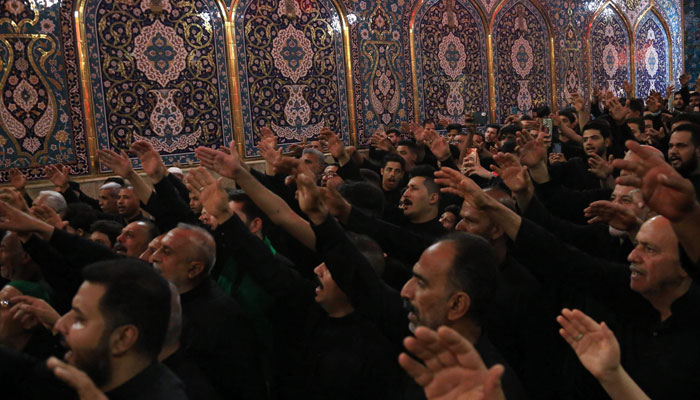Legacy of resistance
Culmination of mourning occurs on Ashura, marking end of Imam Hussain and his family’s brave resistance
The first ten days of Muharram hold deep significance for Muslims -- and in particular the Shia community -- globally as they mourn the sacrifice of Imam Hussain, who stood resolutely against Yazid's larger army at Karbala. The culmination of this mourning occurs on Ashura, marking the tragic end of Imam Hussain and his family’s brave resistance. In Pakistan, however, this period of reflection is marred by the persistent threat of violence against the Shia community. Despite the constant danger, Shias continue to participate in Ashura processions, embodying the defiant spirit of Hussain’s stand at Karbala. The rituals of Muharram carry profound meaning for Shias, but the broader message of Imam Hussain’s struggle is universally relevant. His refusal to accept Yazid’s rule and his commitment to justice without seeking power for its own sake make him a revolutionary figure celebrated across various Islamic traditions. Hussain's stance was not about seeking power but about advocating for positive change and resisting tyranny.
Imam Hussain’s legacy extends beyond sectarian lines -- some would say even religious lines. Even figures as diverse as Mahatma Gandhi have cited Imam Hussain’s courage as an inspiration for standing against oppression. Imam Hussain was one of the first true historical revolutionaries, someone who stood against the shifting tide represented by Yazid, and refused to submit to his authority. He did not intend on going to war; he just wanted a return away from bloodshed and expansionist war. The story of Imam Hussain underscores a broader fight against injustice and brutality, one that transcends sectarian divides and resonates with global values of peace and equality. As we observe Ashura and reflect on the martyrdom of Imam Hussain, we are reminded of the ongoing struggle against hatred and intolerance across the world -- from Gaza to Kashmir and beyond. Muharram, as the first month of the Islamic calendar, calls for a renewed commitment to justice and equality. It is a time to reflect on the legacy of Imam Hussain and his followers, who exemplified extraordinary bravery and conviction. In a world still divided by oppression and injustice, their example urges us to protect the vulnerable and uphold the principles of justice. Today, as we honor Imam Hussain’s legacy, and his family's sacrifices, we must recommit ourselves to combating oppression and ensuring that the spirit of Karbala continues to inspire our fight for a fair and just world.
-
 Prince Harry Reacts As Beatrice, Eugenie's Names Surface In Epstein Emails
Prince Harry Reacts As Beatrice, Eugenie's Names Surface In Epstein Emails -
 Cyprus Joins European AI Race: What It Means For Greek LLMs And Regional Innovation
Cyprus Joins European AI Race: What It Means For Greek LLMs And Regional Innovation -
 Amazon Soon To Launch 'AI Content' Marketplace, Says Report
Amazon Soon To Launch 'AI Content' Marketplace, Says Report -
 Is AI Reliable For Health Advice? New Study Raises Red Flags
Is AI Reliable For Health Advice? New Study Raises Red Flags -
 WhatsApp Web Starts Rolling Out Voice And Video Calling For Beta Users
WhatsApp Web Starts Rolling Out Voice And Video Calling For Beta Users -
 Catherine O’Hara’s Cause Of Death Finally Revealed
Catherine O’Hara’s Cause Of Death Finally Revealed -
 Swimmers Gather At Argentina’s Mar Chiquita For World Record Attempt
Swimmers Gather At Argentina’s Mar Chiquita For World Record Attempt -
 Brooklyn Beckham, Nicola New Move Could Leave David, Victoria Reeling
Brooklyn Beckham, Nicola New Move Could Leave David, Victoria Reeling -
 Anthropic Criticises ChatGPT Ads As OpenAI Begins Testing Advertising In AI Chats
Anthropic Criticises ChatGPT Ads As OpenAI Begins Testing Advertising In AI Chats -
 YouTube Star MrBeast Acquires Step: Redefining Finance For Gen Zs
YouTube Star MrBeast Acquires Step: Redefining Finance For Gen Zs -
 Sarah Ferguson Plans Big Move To Cause ‘serious Damage’ To Andrew
Sarah Ferguson Plans Big Move To Cause ‘serious Damage’ To Andrew -
 Trump Nears 500 Press Interactions In His Second Term, Surpassing Former President Biden
Trump Nears 500 Press Interactions In His Second Term, Surpassing Former President Biden -
 Hailee Steinfeld Reveals Her Plans To Return To Music
Hailee Steinfeld Reveals Her Plans To Return To Music -
 Elon Musk Unveils SpaceX Plan For Civilian Moon, Mars Trips
Elon Musk Unveils SpaceX Plan For Civilian Moon, Mars Trips -
 MTG Commander Banned Update: Wizards Frees Infamous Instant-win Card
MTG Commander Banned Update: Wizards Frees Infamous Instant-win Card -
 Royal Family Braces For ‘final Blow’ As Andrew Scandal Deepens
Royal Family Braces For ‘final Blow’ As Andrew Scandal Deepens




